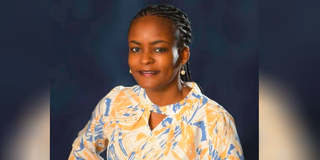Irene Mbwavi's heartfelt calling to fight for ailing children

Dr Irene Mbwavi. She is one of the few paediatric cardiologists in the country.
After the struggles Dr Irene Mbwavi and her family went through when her late father was unwell, she resolved to become a doctor. She is one of the few paediatric cardiologists in the country and currently works at the Karen Hospital.
What exactly does paediatric cardiology involve?
It’s a field of medicine where we treat children with heart diseases. Some of the diseases are acquired while others are congenital, meaning the children are born with them. A fortnight ago, we were actually marking Congenital Heart Defect (CHD) awareness week so it’s great that we’re having this conversation now.
What’s the prevalence in Kenya?
Congenital heart defects are the common birth defect and the second most common cause of death in children below one year. Ninety per cent come from low income countries and especially Sub-Saharan Africa.
Why are they many?
Although 85 per cent of causes are unknown, there are many contributing factors such as infections like syphilis, diet, or certain medication. Congenious marriages and having children at an old age, say above 45, can also cause heart problems in children. Every month, I see at least 20 children with heart disease.
When a child comes to you are you able to tell that they have a heart problem?
There are those who present absolutely no sign and you will find that they have mild defects. Then there are others who will show signs of blue lips and tongues, recurrent chest problems or abnormal sweating among others signs.
How does it make you feel knowing that there are so few of you in the country?
It’s quite disheartening because there are many children with heart conditions who are not able to reach us in good time. Consequently, some develop complications that are irreversible.
What are some of the unique challenges that you face?
We have many children who need our help but are unable to reach us. You realise that we are only a handful of us and most paediatric cardiologists are based in major towns where there are hospitals offering these services.
Sometimes, it gives me sleepless nights because I am a mother and this could be my child. I sometimes sit with inconsolable parents yet I have to tell them the truth. It’s never easy to break the news that a child needs a heart transplant.
What needs to be done?
The government needs to set up training facilities for paediatric cardiologists because there are possibly many people who want to train but lack the funds to seek education abroad. Also, empower hospitals in the counties to diagnose and treat these conditions.
Who is the most important person in your life?
It comes without saying — my family. My mother, especially, has been very instrumental in my life. After our father’s demise, she went through many struggles to put food on the food and educate me and my four siblings. Yet, in one way or another, she managed. It is actually one of the reasons I decided to pursue medicine because besides treating patients, it sort of gave me a guarantee of being able to provide for her.
When you come from such a humble background where you see your parents struggle to provide basic needs, how does it shape your life afterwards?
It has been a journey of making many sacrifices. I have had to forgo vacations and other pleasures so that I can improve my mother’s life and that of my younger siblings. Things are great now. All of my siblings are done with their studies and are working in different sectors. My mother has also retired from her teaching job. When I look back at my journey, there is a lot of satisfaction in knowing that I have fulfilled some of my childhood dreams.
What space does spirituality take in your life?
God is my number one! He is at the centre of every decision and move I make in life. I identify with the bible character Esther. She was where she was for a particular purpose and I feel that I am here to create awareness of heart diseases in children and help improve their quality of life.
At 40, what are you most struggling with?
Balancing work and family life. I am a mother of two and after leaving here, I enter the world of motherhood. There’s homework to be done and spending time with the children. I would honestly wish to meet someone who has figured this out. There’s also the need to keep learning because things keep changing in the industry.
What’s your greatest fear?
It definitely has to be snakes.
What do you do for fun?
I play the piano, golf, go swimming, cycle and travelling. Every year I make sure that I have international travel. So far, Mauritius is my favourite destination.
If you were to tell a younger self something, what would you tell her?
Many things come to mind but on top of the list is for her to listen to her sixth sense. I call it the voice of the Holy Spirit. Over time, I have observed that every time I went against my instincts, things played out in the exact way that I had feared.





